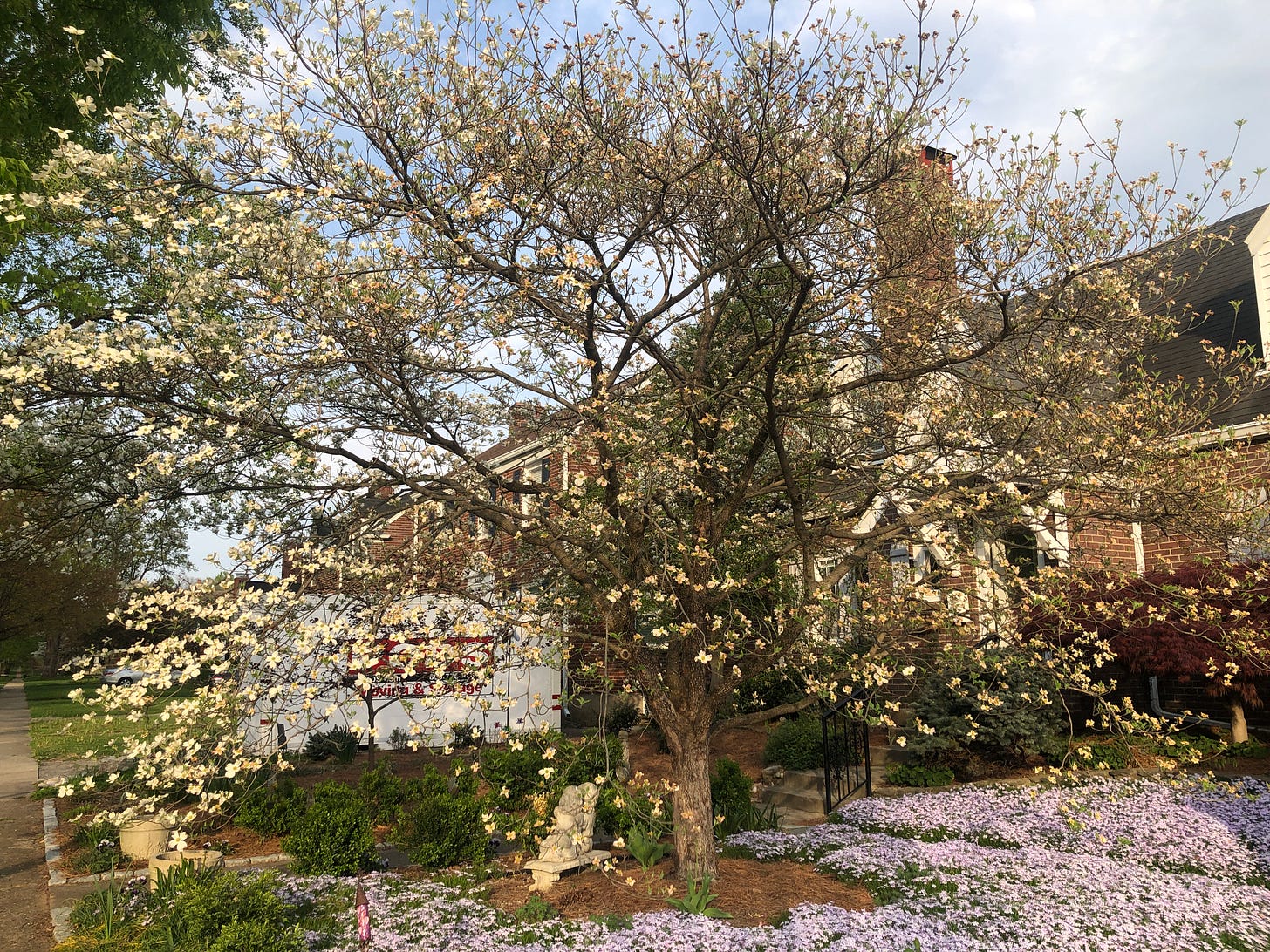Infophilia, a Positive Psychology of Information | April 19, 2025 | Vol. 3, Issue 18
✨Welcome to Infophilia, a weekly letter exploring how our love of information and connections can help us all thrive, individually and collectively.
Cite as: Coleman, Anita S. (2025, April 19). Infophilia in bloom: cultivating curiosity, wonder, and connection. Infophilia, a positive psychology of information, 3 (18).
Dear readers,
I'm taking a short break for Easter weekend to rest and recharge. The regular curiosity-sparking content you enjoy will return next week! 😊
In the meantime, here are three treats to keep your minds happily occupied:
Try a perspective flip - Enjoy the biophilia connection: A perspective flip means looking at familiar things through an entirely new lens. I’ve previously written how biophilia, a love of plants and animals, is also connected to our infophilia, the human love of information and connections. This weekend, whether you celebrate Easter or not, consider the dogwood blossoms, which bloom during this season. In Christian tradition, the dogwood's cross-shaped flowers with "crown of thorns" centers are said to symbolize the crucifixion of Jesus. Reading the 2024 Pulitzer Prize-winning biography Master Slave Husband Wife by Ilyon Woo has me connecting Easter to America's painful history of slavery in the South. How might these overlapping meanings of resurrection hope and historical reckoning inform one another? Try finding your own unexpected connections between nature, history, and meaning.
(Note: Master Slave Husband Wife by Ilyon Woo is about the 1848 escape of Ellen and William Craft from slavery in Georgia, their subsequent abolitionist work, and the broader historical context of pre-Civil War America. While the book’s themes are liberation and resilience, there’s no explicit link to Easter.
The flowering dogwood (Cornus florida) is native to Kentucky, Eastern US, US South, and northern Mexico.)
Build a connection web - Read The Last London Bookshop: A connection web is about discovering surprising links between seemingly unrelated ideas. The Last London Bookshop by Madeline Martin is a historical fiction book inspired by the World War II history of bookshops during the “Blitz.” In vivid moving prose Martin, celebrates communal reading experiences during the bombings of London in WWII. The book is about a young woman, Grace Bennett, who becomes a passionate reader. Her read-aloud sessions—simple, heartfelt sharings of English literature without author appearances or hype—bring hope, save lives, and build deep connections among strangers, reminding us why we love books in the first place. As you read, notice how books, romantic and other kinds of love, including biophilia, community, history, and human resilience interweave in unexpected ways.
(Note: Grace used The Count of Monte Cristo by Dumas and A Christmas Carol by Dickens for her community readings.)
Get into wonder mode - Watch Last Christmas: Wonder mode is all about seeing the world with fresh eyes, curiosity, and an open heart. Last Christmas, a heartwarming 2019 romantic comedy set in London, England, invites us into that very mindset. It follows a young Croatian woman (played brilliantly by Emilia Clarke) who has lost her sense of wonder... and finds it again when a mysterious man helps her (the ever-charming Henry Golding). More than just a holiday film, it’s a layered story of belonging, healing, and rediscovery. Michelle Yeoh delightfully is “Santa,” the eccentric owner of a Christmas shop. Emma Thompson delivers a poignant performance as the protagonist’s mother, a Croatian immigrant who fled the former Yugoslavia and still longs for the home she left behind, while living in a city where she doesn’t always feel welcome. Let this film move you. Let it remind you how awe and presence can return in the most unexpected ways. As the seasons shift, it's a perfect story for spring renewal. While watching, ask yourself: what reawakens your sense of wonder?
(Note: There is a separate book titled Last Christmas published by Emma Thompson and Greg Wise, which is a collection of personal essays about the meaning of Christmas, but this book is not referenced in the film, which, btw, received negative reviews!
Neuroscience tells us that moments of awe and novelty activate the brain’s reward system, enhancing memory, attention, and emotional well-being. Psychologists link wonder to prosocial behaviors, greater life satisfaction, and even a sense of purpose. Whether sparked by a scientific discovery or a tender scene in a film, wonder deepens our engagement with the world. We stay curious and connected.)
All this curiosity and wonder? That’s infophilia, a healthy, joyful lens through which we engage with our love of information. It’s the antidote to FOMO and information overload. Infophilia offers a fresh take on information literacy and critical thinking, empowering you to turn the pages of disinformation and post-truth with discernment, and to rediscover the quiet wisdom nestled between the lines of authentic knowledge. When you engage mindfully with many different perspectives, make thoughtful connections, and nurture your sense of wonder, your relationship with information transforms, released from anxiety and apathy, and revived like a well-loved book re-read in the light of of a simply splendid spring!
Wishing you a weekend filled with delightful discoveries,
Anita







I am concerned that we are losing our capacity for curiosity and wonder because of the filters and guardrails advanced by our increasingly authoritarian society. Not just authoritarian government, which is bad enough, but the authoritarianism that comes from our locked-in worldviews, built in silos that resist accepting, or even recognizing, the role of wonder built through exploration into multi-faceted visions of life. We are so afraid of being damaged by the larger world, that we huddle in tiny rooms, never seeing the wonder outside. I'm much happier opening myself to the amazing larger world and doing this without fear. Thanks again, Anita.